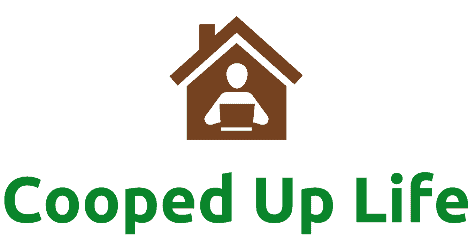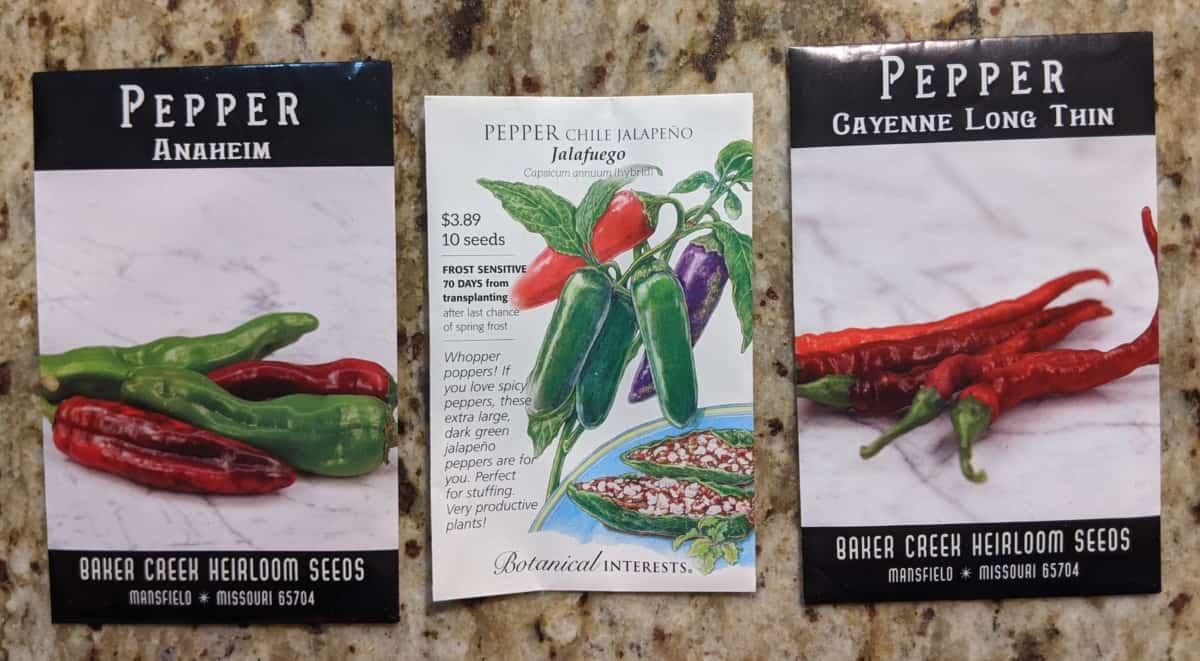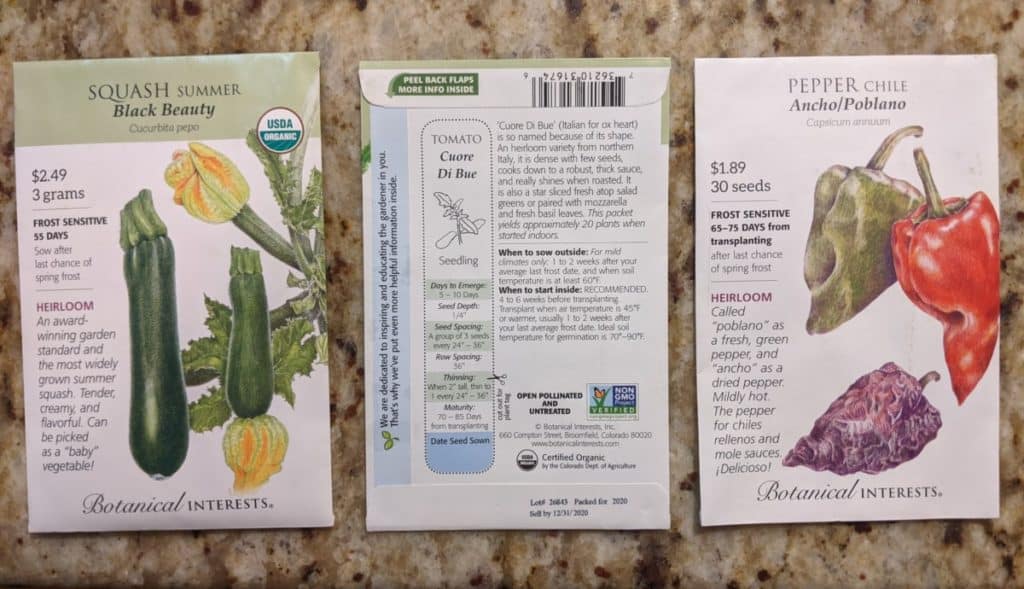
All gardeners make a choice about growing from vegetable garden seeds or purchasing plants for their garden. There are advantages to both and more some plants I would recommend buying the plant over starting from seed.
Not everyone has the time, equipment, or desire to start their own vegetable garden seeds. Others save their seeds from the last year’s harvest. We do this for certain plants and hope to do more this coming season.
My husband and I love seed shopping though, and this year once again we may have gone overboard.
When buying vegetable seeds you should consider what you want to eat, specific varieties, seed company brand, heirloom vs organic seeds, your climate, the season, your soil, and the cost per seed packet.
- Starting Seeds Vs Buying Plants
- Where should I buy vegetable seeds?
- When Should I Buy Vegetable Seeds?
- What Vegetable Seeds Should I Plant?
- Can You Save Seeds From Store-bought Vegetables?
- What Is An Heirloom Seed?
- What Are Hybrid Vegetable Seeds?
- What is a Non-GMO seed?
- Should I Start All Seeds Indoors?
- Are All Vegetables Grown From Seeds?
- What Is a Planting Zone?
- What is a Growing Season?
Starting Seeds Vs Buying Plants
So let’s talk seeds. Seed saving has many advantages and helps reduce costs in your garden. The average cost of vegetable seeds is only a few dollars, but it can add up when you go a bit overboard. We spent $68 on our last order alone.
When you compare a bag of seeds, even the rare variety that can cost about $4 per 30 seeds, to buying a seedling the price is still much lower. Purchasing a small plant can cost 4 dollars or more for a flat.
Take for instance the tomato, I paid $2.49 for about 25 seeds. From this, I will use about 10 seeds and produce about 8 plants. If I were to buy 8 tomato plants at $4/plant I would spend $32 on tomatoes for my garden.
I personally like heirloom and rare tomatoes. These are hard to find in my area in plant form. Unless you are going to your local farm or farmers market. Even then the selection online is much greater.
Vegetable garden seeds do take more time and work. If you’re in a rush to get your garden started you may want to start with plants from your local garden nursery.
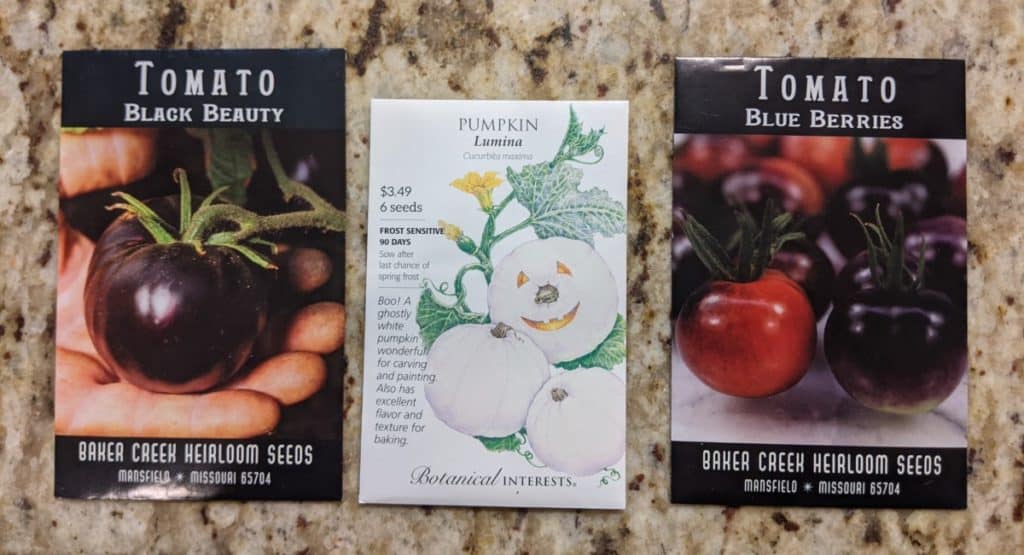
Where should I buy vegetable seeds?
There are many places to buy vegetable garden seeds, walk into any Home Depot or Lowes, and they have a selection of seeds available. These seeds are usually priced well and cost a few dollars per packet. They usually have a good-sized selection of the most popular seeds for your area.
Botanical Interests Seeds
If you have a local garden center or feed store I would recommend checking there as well. I have found that most of the ones in my area carry Botanical Interests brand seeds.
We have a lot of success with this brand, more so than the Big Box store seeds. You can also check out their website for a large selection of seeds.
One of my favorite things about the botanical Interests seed packets is the sheer amount of information provided. Most seed packages have basic planting information, but Botanical Interests gives you so much more.
Opening up the pumpkin seed packet revealed information ranging from general pumpkin, historical, optimal growing conditions, harvesting, how to store, and even has a recipe for baked pumpkin dessert!
Going to their website you can also download a free garden seed catalog and a seed starting guide. Both are great resources for gardeners at any level.
They also make available their grow and sow guides by plant. This is the information that can be found on the inside of the packet. My packets have a tendency to rip and the writing is small so having this available on-line is very helpful.
Baker Creek Heirloom Seeds
Another favorite is Baker’s Creek Heirloom Seeds. They have all of your regular seed choices, plus so many heirloom varieties and rare seeds. It’s probably why the website is rareseeds.com! They are one of the best places to buy vegetable seeds online.
I just ordered black tomatoes, blueberry cherry tomatoes, yellow tomatoes, purple bell peppers, and a green pumpkin heirloom variety to name a few.
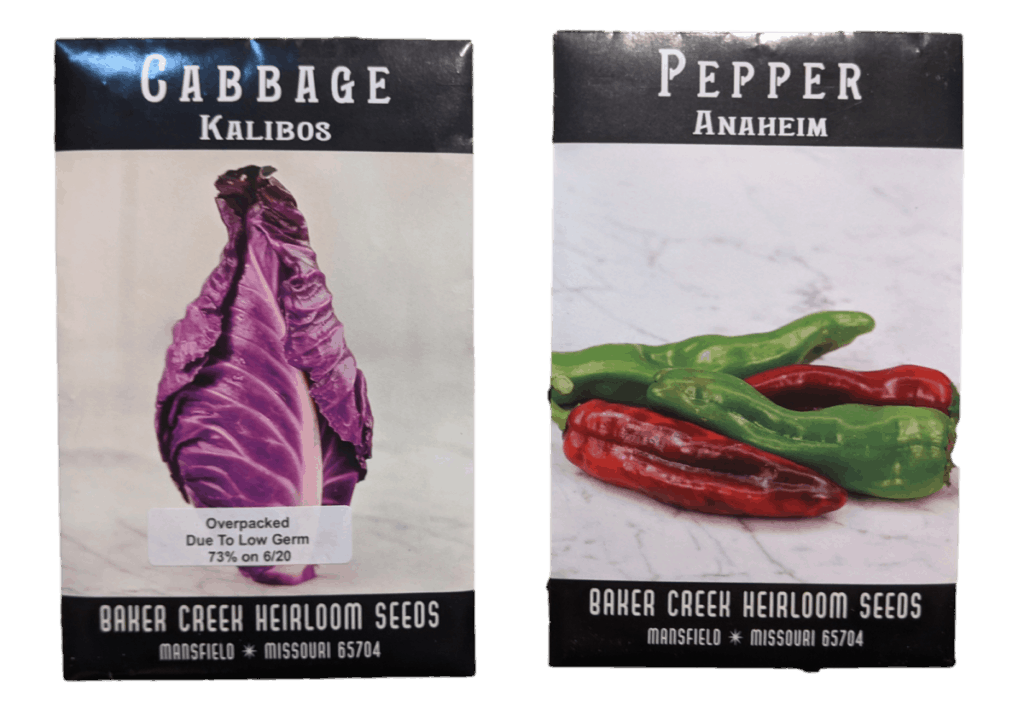
Seed Savers Exchange Seeds
We also purchase seeds from Seed Savers Exchange they offer non-GMO vegetable seeds, heirloom vegetable seeds, and organic vegetable garden seeds.
What’s great about them is that they are a seed exchange dedicated to the preservation of heirloom seeds. They have many unusual seed varieties to choose from when you’re buying seeds.
When Should I Buy Vegetable Seeds?
It’s never too soon to purchase seeds for your garden. However, most seed companies are busiest in January when most gardeners are planning the current year’s garden.
This year there are some companies so busy that they have temporarily shut down their sites!
Vegetable garden seeds that you purchase online are usually good for a few seasons, although they may not all seed the following year, most will. That means even if you buy your seeds too early it’s no cause for alarm.
If you save your own seeds they would also be sitting around waiting for the next season, so why not order them when you want.
The other advantage to ordering early is that most seeds will be in stock. I waited until January this year and the pickings were slim.
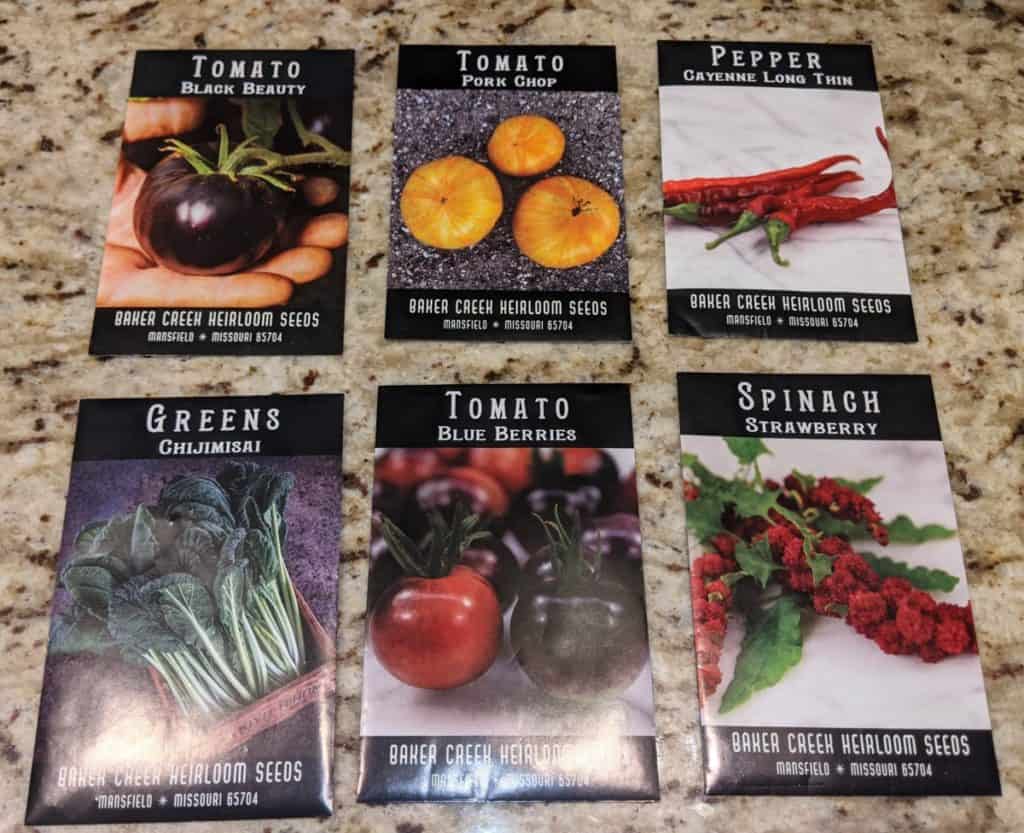
What Vegetable Seeds Should I Plant?
If you’re new to gardening, I would start small. Depending on your climate and zone, pick the easiest vegetables and herbs that grow well in your area. Preferably your favorite, and the more expensive vegetables.
Peppers Are Easy To Grow
I grow a lot of bell peppers and tomatoes, as we go through quite a bit of these. In my area, you can expect to pay about $1.30 per colorful bell pepper.
The green ones are usually less, but I like the colorful peppers best. It’s lovely to go outside and pick my fresh produce for dinner as well.
Peppers are also relatively easy to grow and start indoors. Hot peppers are probably our most successful crop. In our climate, they have a long growing season and pests seem to leave them alone for the most part.
We love that we make most of our spices at home, and where can you go and buy powdered Carolina Reaper peppers?
Grow Tomatoes From Seeds
Tomatoes, while more difficult to grow and require more tending and pest control, are also a staple in our vegetable garden. I love the heirloom tomatoes that you can’t find anywhere else, how many grocery stores carry Cherokee Purple tomatoes? None in my area at least.
Grow Herbs From Seeds
Rosemary, basil, thyme, oregano, and other herbs are also expensive to purchase, but easy to grow. Many of these can be grown inside with the help of a sunny window.
For outdoor gardens, these are even easier to grow. Just be careful because some herbs can completely take over your garden, here’s looking at “you” lemon balm. (My entire yard is now covered in random lemon balm plants, not to mention the garden.)
Herbs are great for a container garden and some can help with pest control in your garden.
These herbs are also wonderful for drying and having your own herbs on hand to flavor your food is awesome. Some of my neighbors will swing by just to grab a handful of herbs from my garden. Since these plants are so prolific, I’m happy to share.
Grow Squash and Pumpkins From Seeds
Recently in my area, we’ve seen an abundance of squash beetles and lady bug squash beetles.
This has decimated our squash and pumpkin harvests the last two years. The effort that it takes to keep ahead of the pests wasn’t worth the yield or the effort. We have a natural garden so no chemical pesticides.
This year I’m starting a new bed on the side of the house. Hopefully this far enough away from the other garden, so I’ll get to try pumpkin again, but not zucchini. I can get that easily and inexpensively from the grocery store, so it’s not worth the garden space.
Grow Broccoli and Cabbage From Seeds
Again us spending time trying to grow broccoli, brussels sprouts, and cabbage has so far not been worth the time or effort. So plan for the crops that you want to eat, but are expensive to buy, and easy to grow, for your first vegetable garden.
Can You Save Seeds From Store-bought Vegetables?
The Short answer is, yes. Some vegetable garden seeds will be hybrid seeds, which means they either won’t work or you have no idea if it will be good or bad.
If I’m going to go through the effort of raising this seedling and planting it I want the best possible outcome, not a gamble.
I personally enjoy ordering seeds from companies that I like. Seed providers that are giving back to the community, only sourcing the best seeds, and that promote seed saving.
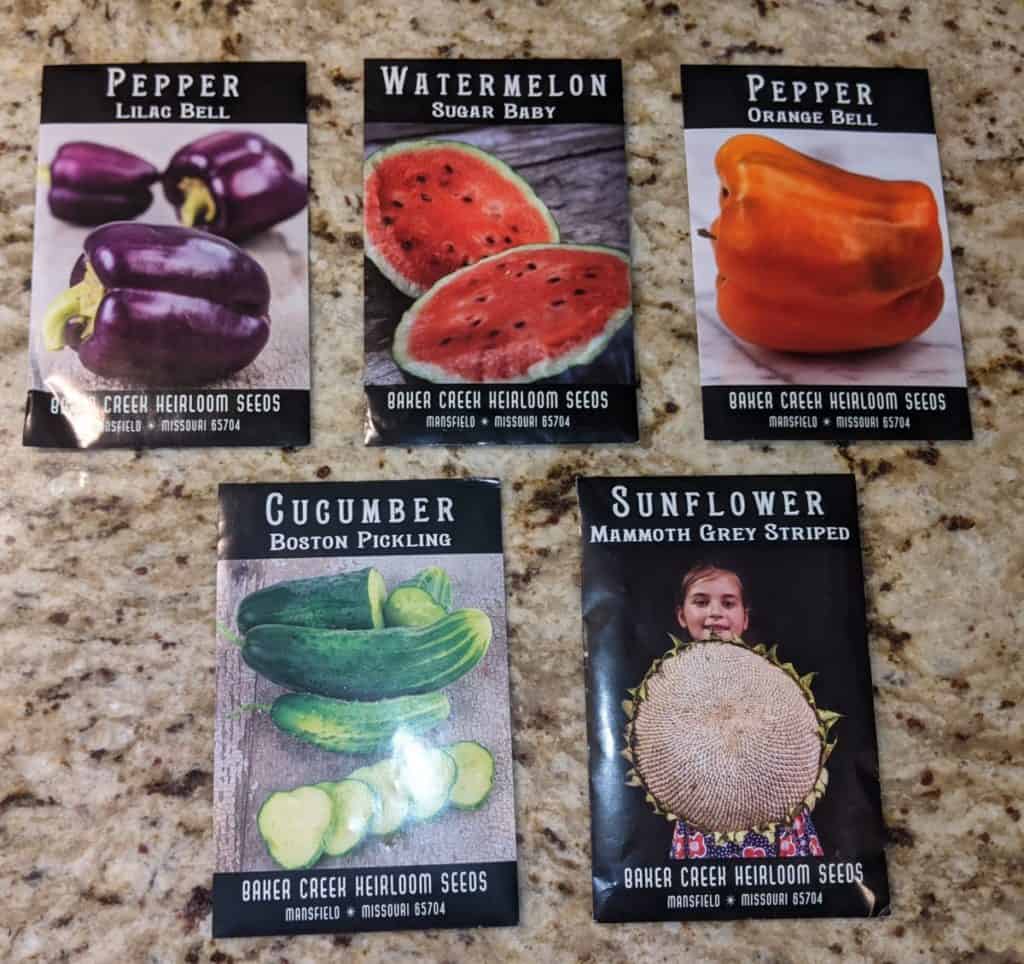
What Is An Heirloom Seed?
An heirloom seed is one that has been around for 50 years or more, that are open pollinated varieties. Open pollination means that insects, birds, wind, and other natural pollination occur.
With an heirloom seed, when you save your seeds you know that it will produce the same results next year. Heirloom seeds are also Non-GMO. We generally only use heirloom seeds for our garden whenever possible.
What Are Hybrid Vegetable Seeds?
A hybrid seed is a seed that comes from crossing two varieties of the same plant. This can happen naturally, cross-pollination in your yard. Which could explain some of our failed seed saving efforts previously.
Mostly though, when we talk about hybrid seeds, we mean ones that are crossed intentionally by humans.
This leads to an inbreeding of the plants and is often used to increase yield. For my garden, I prefer the heirloom going for quality taste over quantity of harvest.
What is a Non-GMO seed?
GMO stands for a genetically modified organism. These seeds are changed in a laboratory to be resistant to different things, usually pesticides. It’s my understanding that you can’t really buy GMO seeds unless you are a farmer.
You can try to grow seeds from grocery store vegetables that are GMO’s but I wouldn’t due to the quality of seed.
That being said, better safe than sorry, so look for a company that is Non-GMO. I feel that there hasn’t been enough long-term research on the effects of GMO’s on our diet or soil. So I don’t feel comfortable introducing them into my garden.
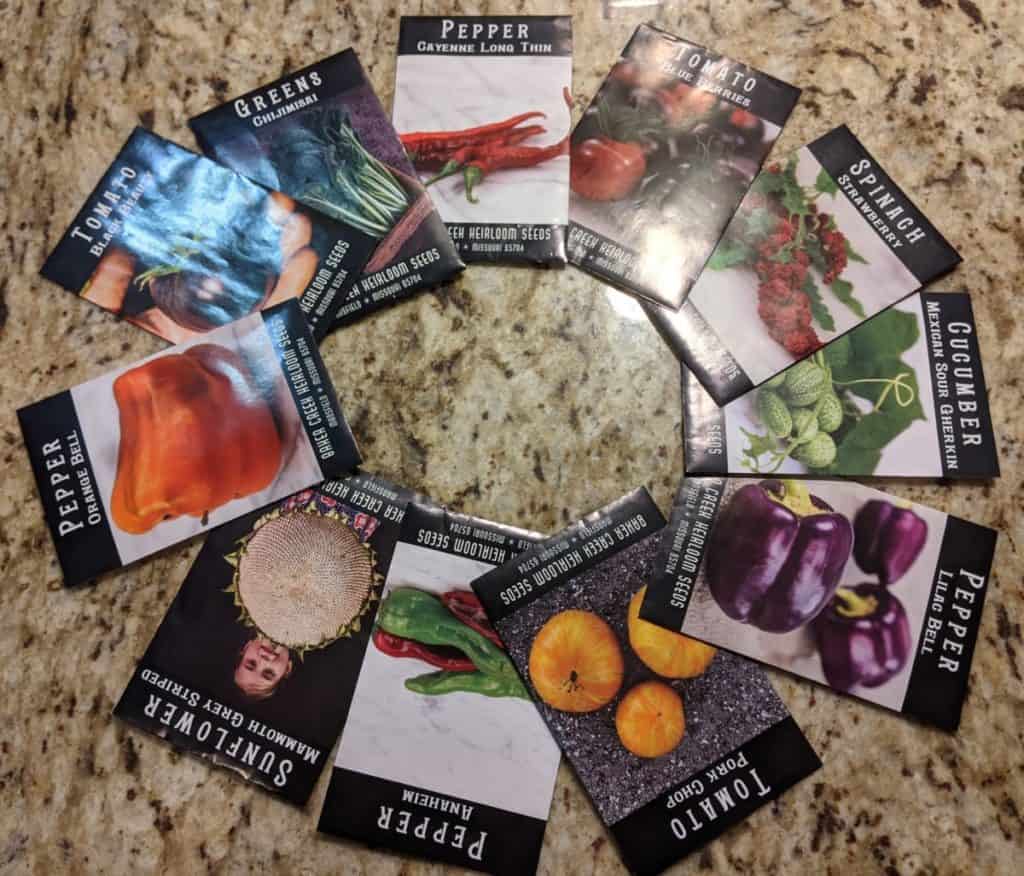
Should I Start All Seeds Indoors?
No. Most vegetable garden seeds can go directly into the soil. If your growing season is long enough this is the easiest way to start your garden. Some seeds actually don’t do well-being transplanted and others germinate and grow quickly so direct sowing is recommended.
Corn, squash, beans, melons, and cucumbers do best planted outdoors.
Tomatoes, peppers, and eggplant are all plants that benefit from being started inside. However, I have many tomato plants that suddenly appear in spring that grew outside from seed.
Are All Vegetables Grown From Seeds?
Some veggies such as onions, shallots, and garlic are grown from bulbs. Potatoes are grown from other potatoes, ever seen a potato with a green branch growing from it? Well, that is the part that you plant. Asparagus is also easier to grow from crowns than seed (at least it has been for us).
What Is a Planting Zone?
USDA Plant Hardiness Zones are the standard by which gardeners know what plants will be hardy and thrive the best in their location. There are 13 main zones that are broken even further down if needed.
For example, I’m in Zone 8, which is great for peppers and tomatoes, but not warm enough to grow bananas. For my more northern friends, they probably have better luck with the cabbages and broccoli that doesn’t do as well in my zone.
What is a Growing Season?
A growing season is a time between your last frost date of the winter and the first frost date in the fall. Your growing season is determined by your climate and relates to your hardiness zone.
This is critical information, especially for spring planting, it’s frustrating seeing your hard work freeze and become useless.
It is possible to plant early and cover your plants with plastic to keep them safe. You can find plenty of products online for this purpose. I’ve even seen a setup with windows used as little greenhouses over the seedlings, but this requires money and time to put together.
For those with shorter growing seasons, I definitely recommend starting vegetable garden seeds indoors to get a head start on your garden production.
